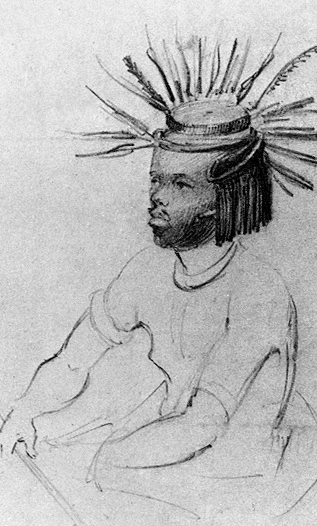
The Mpondo People, or simply Ama-Mpondo, is a kingdom in what is now the Eastern Cape. It was established in 1224. The Ama-Mpondo Nation was first ruled by its founder who was King Mpondo kaNjanya who lived around and later the 'Ama-Nyawuza' clan, by nationality referred to themselves as 'Ama-Mpondo'. They are related to other Aba-Mbo kingdoms and chiefdoms in South Africa.

King Sarhili Ka-Hintsa(about 1810 - 1892) was the King of Xhosa nation from 1835 until his death in 1892 at Sholora, Bomvanaland. He was also known as "Kreli", and led the Xhosa armies in a series of frontier wars.
King Gwebinkumbi ka-Sigcawu was the king of the AmaXhosa Nation from 1902 until his death on the 30 May 1921 and his brother Daliza Sigcawu was regent for his son. His father was King Sigcawu kaSarili.
Daliza Sigcawu was the regent and 8th king of the Gcaleka sub-group of the Xhosa nation from 1921 to 1923. He came to power after his brother Salukaphathwa Gwebi'nkumbi Sigcawu died and until he handed over the reign to his nephew Mpisekhaya Ngangomhlaba Sigcawu in 1923. His father was Sigcawu ka Sarili.
King Ngangomhlaba ka-Gwebinkumbi was the King of the AmaXhosa nation from late 1923/1924 to June 1933 and his Bungeni Zwelidumile Sigcawu took over the throne after his death. His father was King Salukaphathwa Gwebi'nkumbi Sigcawu.
King Zwelidumile Ka-Gwebinkumbi was the King of the AmaXhosa Kingdom of South Africa from 2 June 1933 to 9 April 1965. He took over the reins when his oldest brother Mpisekhaya Ngangomhlaba Sigcawu died. He was born near Willowvale in the Cape Colony to Salukaphathwa Gwebi'nkumbi Sigcawu.
King Xolilizwe Ka-Zwelidumile was the King of the Xhosa people from 10 April 1965 to 31 December 2005. King Xolilizwe was an active member of the National House of Traditional Leaders of South Africa. He was the oldest son of King Bungeni Zwelidumile Sigcawu.
King Zwelonke ka-Xolilizwe was a South African royal and King of the Xhosa people. He became king on 1 January 2006. Zwelonke was born at Nqadu Great Palace in Willowvale in the Eastern Cape to Xolilizwe Mzikayise Sigcawu and Nozamile.
Rharhabe ka Phalo was a Xhosa Prince and the founder of the Right Hand House of the Xhosa nation. Rarabe was the eldest son and right hand son of King Phalo ka Tshiwo.
The Rharhabe House is the second senior house of the Xhosa Kingdom. Its royal palace is in the former Ciskei and its counterpart in the former Transkei is the Gcaleka, which is the great house of Phalo.
King (iKumkani) Maxhob'ayakhawuleza Sandile "Aa! Zanesizwe!" was the son of the late King Mxolisi Sandile "Aa! Bazindlovu", who was the son of King Archie Velile Sandile, and Queen Nolizwe, the daughter of Western Mpondoland King Victor Poto Ndamase "Aa! Bhekuzulu", and sister to both King Tutor Vulindlela Ndamase "Aa! Nyangelizwe" and the wife of Chief Thandathu Jongilizwe Mabandla of the AmaBhele aseTyhume royal clan. He was the 6th descendant of Sandile and 10th descendant of King Phalo, the Son of King Tshiwo.

The Gcaleka House is the Great house of the Xhosa Kingdom in what is now the Eastern Cape. Its royal palace is in the former Transkei and its counterpart in the former Ciskei is the Rharhabe, which is the right hand house of Phalo.
The Minerals Council South Africa is a South African mining-industry employer organisation. Its members include famous South African mining houses such as Anglo American, De Beers, Gold Fields and Harmony. In its current form, it was founded in 1968 as the Chamber of Mines, a South African wide organization. Prior to that year, it has its early origins as the Transvaal Chamber of Mines in 1887, then evolved over many years reforming as the Witwatersrand Chamber of Mines in 1889, the Chamber of Mines of the South African Republic from 1897, Transvaal Chamber of Mines from 1902 and lastly from 1953 until 1967 as the Transvaal and Orange Free State Chamber of Mines. On 23 May 2018, the South African Chamber of Mines rebranded themselves as the Minerals Council South Africa.
Willowvale is a town in Amathole District Municipality in the Eastern Cape province of South Africa.
King Vulikhaya ka-Xolilizwe is the King of Xhosa people. He was born in 1970 in Nqadu Great Place in Willowvale by King Xolilizwe Sigcawu and Queen Nogaweni. He took over as the King in 2020 after the death of caretaker Xhosa King INkosi Nongudle Dumehleli Mapasa who took over following the death of his brother King Zwelonke Sigcawu in 2019. He was a South African High Commissioner to Malawi before he could ascend the throne as the Xhosa King.
Sigcawu is a South African surname that may refer to
King Vulindlela Nyangelizwe KaPhangwa was the third President of the bantustan of Transkei, which was granted nominal independence from South Africa on 26 October 1976. He was the King of Western Mpondoland, the son of King Victor Poto Ndamase, the brother to Xhosa Queen Nondwe Sigcawu the wife of King Xolilizwe Sigcawu; AmaRharhabe Queen Nolizwe Sandile the wife of King Mxolisi Sandile and mother of King Maxhob'ayakhawuleza Sandile; and Chieftain Nolusapho Mabandla of the wife of AmaBhele Chief Thandathu Jongilizwe Mabandla.



